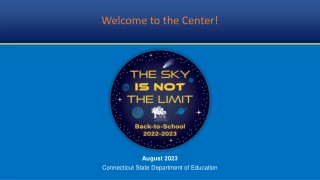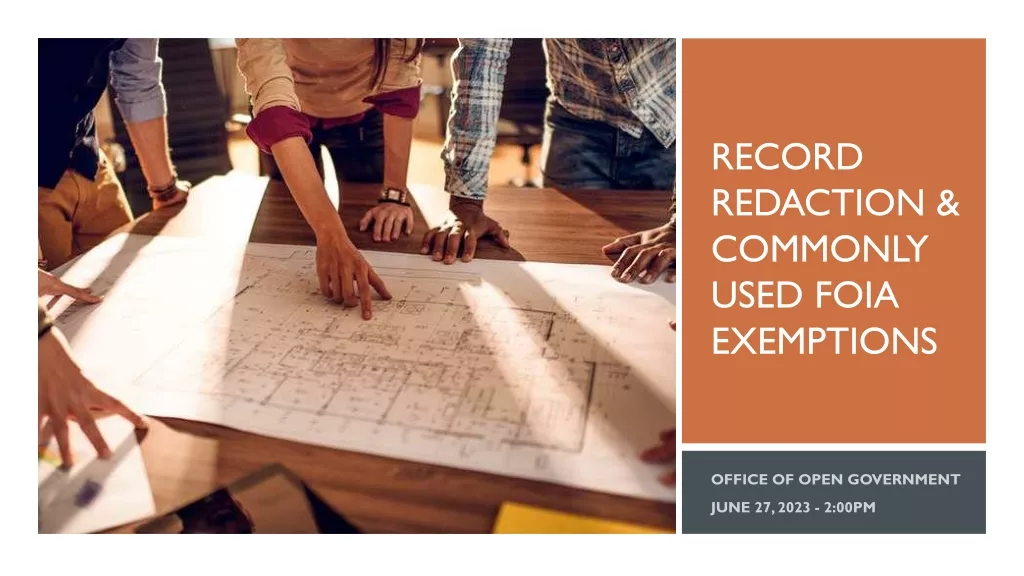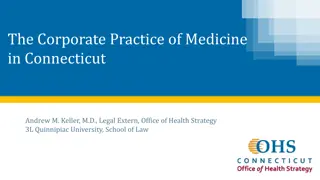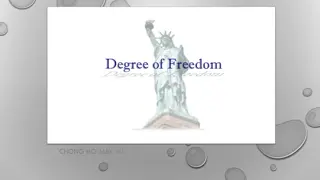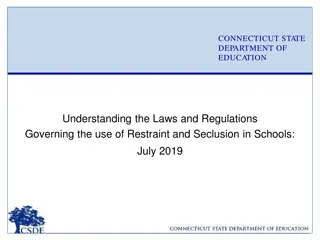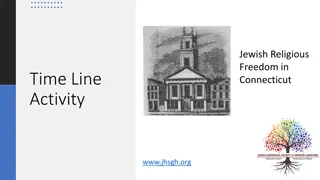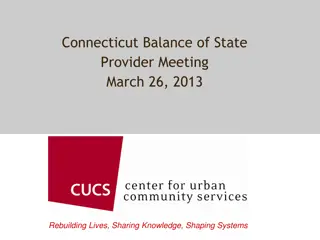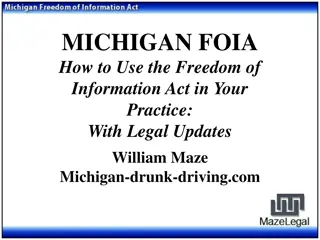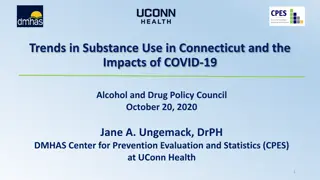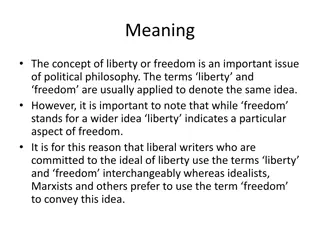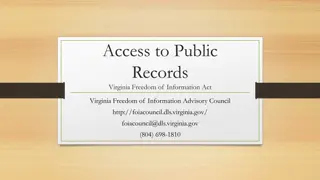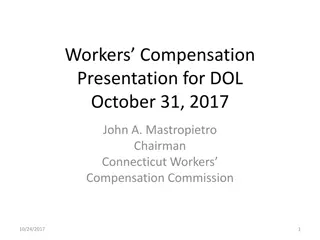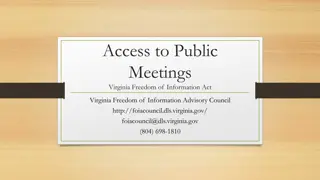The Connecticut Freedom of Information Act (FOIA)
Explore the essentials of the Connecticut FOIA, including its history, basics, definition of public agencies, and insights into meetings. Learn how the FOIA promotes transparency and accountability in government operations.
Download Presentation

Please find below an Image/Link to download the presentation.
The content on the website is provided AS IS for your information and personal use only. It may not be sold, licensed, or shared on other websites without obtaining consent from the author.If you encounter any issues during the download, it is possible that the publisher has removed the file from their server.
You are allowed to download the files provided on this website for personal or commercial use, subject to the condition that they are used lawfully. All files are the property of their respective owners.
The content on the website is provided AS IS for your information and personal use only. It may not be sold, licensed, or shared on other websites without obtaining consent from the author.
E N D
Presentation Transcript
FOI 101: A Crash Course In The FOI Act Connecticut Freedom of Information Commission Russell Blair Director of Education & Communications 860-256-3968 | russell.blair@ct.gov
Brief History Of The FOIA Brief History Of The FOIA The legislature finds and declares that secrecy in government is inherently inconsistent with a true democracy, that the people have a right to be fully informed of the action taken by public agencies in order that they may retain control over the instruments they have created; that the people do not yield their sovereignty to the agencies which serve them; that the people in delegating authority do not give their public servants the right to decide what is good for them to know. Freedom of Information Act Preamble, Oct. 1, 1975 Connecticut Gov. Ella Grasso
FOIA Basics FOIA Basics The Freedom of Information Act grants public access to meetings and records of public agencies Public agencies cannot be required to conduct research or produce documents that don t exist FOIA does not give the public the right to participate (speak) at a meeting, just to attend The Freedom of Information Commission settles disputes that arise when citizens believe agencies are not following the law
What is a Public Agency? What is a Public Agency? Public agency or agency means: (A) Any executive, administrative or legislative office of the state or any political subdivision of the state and any state or town agency, any department, institution, bureau, board, commission, authority or official of the state or of any city, town, borough, municipal corporation, school district, regional district or other district or other political subdivision of the state, including any committee of, or created by, any such office, subdivision, agency, department, institution, bureau, board, commission, authority or official Board of Trustees of Woodstock Academy v. FOIA (1980): Created functional equivalent test 1. Whether the entity performs a government function 2. The level of government funding 3. The extent of government involvement or regulation, and 4. Whether the entity was created by government
Meetings Meetings
Meetings, Overview Meetings, Overview Meeting means any hearing or other proceeding of a public agency, any convening or assembly of a quorum of a multimember public agency, and any communication by or to a quorum of a multimember public agency, whether in person or by means of electronic equipment, to discuss or act upon a matter over which the public agency has supervision, control, jurisdiction or advisory power. Sec. 1-200, CT General Statutes Anybody can attend (no required sign up); boards set their own rules for public comment Meetings may be photographed, recorded or broadcast Agendas must fairly apprise the public on what will be discussed
Regular Meeting vs. Special Meeting Regular Meeting vs. Special Meeting Meetings according to regular schedule filed with your municipality or the state Notice/agenda required at least 24 hours in advance By a 2/3 vote items can be added to the agenda during the meeting Minutes must be filed within 7 calendar days Meetings outside of your regular schedule Notice/agenda required at least 24 hours in advance AND must be posted on website Additional items CANNOT be added to the agenda during the meeting Minutes must be filed within 7 business days
Emergency Meetings Emergency Meetings Must only be called if there is a bona fide emergency that cannot wait 24 hours No notice or agenda is required Only emergency matters may be considered Minutes must be filed within 72 hours of the meeting, posted online and state the reason for the emergency "A situation must be unexpected and it must demand immediate action such that it is impossible for the public agency to give 24 hours notice of a meeting. Board of Selectmen of the Town of Ridgefield vs. Freedom of Information Commission (2010)
Electronic/Remote Meetings Electronic/Remote Meetings Regular meetings: Require 48-hour notice; agenda with link can come 24 hours before Special meetings: Require 24-hour notice with agenda Online-only meetings must be recorded and posted on the agency s website within 7 days and available for at least 45 days You must still submit minutes, even if a recording is available Online participants can be kicked out if they are being disruptive (same as at an in-person meeting)
Executive Session Executive Session It s OK to meet behind closed doors for five specific reasons: Personnel matters (Person being discussed can request open session) Pending claims or litigation Security Sale or lease of property Discussion of records exempt from FOIA Must vote by 2/3 to go into Executive Session Meetings still require notice/agenda (try to be specific) You cannot vote during Executive Session Staff can be invited in to assist; do not create a second audience
When Is A Meeting Not A Meeting? When Is A Meeting Not A Meeting? The Freedom of Information Act carves out exemptions to its meeting requirements for the following: Personnel search committees for executive-level employees Strategy or negotiations related to collective bargaining Caucuses Staff meetings Chance/social meetings
Email & Meetings Email & Meetings From meeting definition: whether in person or by means of electronic equipment OK to discuss items to add to agenda, or scheduling matters Back-and-forth debate over issues should be saved for public meeting
Minutes Minutes Only requirement is a recording of who voted for what or for whom Must be available within 7 days of the meeting (draft minutes are OK) Still required even if a recording of a virtual meeting is posted
Records Records
Public Records, Definition In FOI Act Public Records, Definition In FOI Act Public records or files means any recorded data or information relating to the conduct of the public's business prepared, owned, used, received or retained by a public agency, or to which a public agency is entitled to receive a copy by law or contract under section 1-218, whether such data or information be handwritten, typed, taperecorded, videotaped, printed, photostated, photographed or recorded by any other method. Except as otherwise provided by any federal law or state statute, all records maintained or kept on file by any public agency, whether or not such records are required by any law or by any rule or regulation, shall be public records and every person shall have the right to (1) inspect such records promptly during regular office or business hours, (2) copy such records in accordance with subsection (g) of section 1-212, or (3) receive a copy of such records in accordance with section 1-212.
Public Records, Overview Public Records, Overview Public can inspect records at no charge You can charge for paper copies at 50 cents per page (cities & towns) or 25 cents per page (state agencies); can also charge for digital storage (USB drive, DVD); if more than $10 is owed you can collect the fee up front $20 per session fee for portable scanner (not cellphone) Can t charge for copies of electronic records No requirement that a specific form be used Agencies do not have to do research or create records that don t already exist
How Long Do I Have to Fulfill A Request? How Long Do I Have to Fulfill A Request? Must acknowledge records requests within 4 business days Must fulfill record requests promptly. Advisory Opinion No. 51: Without undue delay. FOI a primary duty. Consider: the volume of records requested; the amount of personnel time necessary to comply with the request; the time by which the requestor needs the information contained in the records; the time constraints under which the agency must complete its other work; the importance of the records to the requester, if ascertainable; and the importance to the public of completing the other agency business without the loss of the personnel time involved in complying with the request
Exemptions, Exclusions, Exceptions Exemptions, Exclusions, Exceptions Exemptions: Permissive (optional), Sec. 1-210 Exclusions: Cannot be disclosed, Sec. 1-217 (home addresses) Exceptions: Except as otherwise provided by any federal law or state statute.
Exceptions Exceptions Federal laws: HIPPA, FERPA Other state statutes CGS 10-151c: Public school teacher evaluations CGS 1-82a: Ethics complaints (prior to probable cause finding) CGS 36a-21: Department of Banking records
Exemptions Exemptions Preliminary drafts/notes Personnel or medical files that would be an invasion of privacy if disclosed Certain law enforcement records Records relating to pending claims/litigation Trade secrets Test questions, scoring keys and other examination material Real estate appraisals while acquisition of a property is pending Records related to collective bargaining strategy/negotiation Records protected by attorney-client privilege Information obtained by use of illegal means Whistleblower complaints Adoption records Plans/records that pose a security risk Responses to bid solicitations, RFPs (until contract is awarded)
Personnel Files Personnel Files Only exempt if there is an invasion of personal privacy Two-part test: Highly offensive and not a matter of public concern (Perkins v. FOIC, 1993) If there is a privacy concern, contact the employee, they have the right to request the records be withheld and ask FOIC to weigh in
Preliminary Drafts/Notes Preliminary Drafts/Notes Preliminary drafts or notes relates to advisory opinions, recommendations and deliberations comprising part of process by which government decisions and policies are formulated; they reflect that aspect of the agency's function that precedes formal and informal decision making Public interest in withholding documents must outweigh public interest in disclosure
Security Risk Security Risk Agencies do not have to release records when there are reasonable grounds to believe disclosure may result in a safety risk. State agencies: Consult with the Commissioner of the Department of Administrative Services Cities/towns: Consult with the State Police Judicial: Chief Court Administrator makes the call Legislative: Executive director of legislative management decides
Law Enforcement Exemptions Law Enforcement Exemptions Confidential informants Identities of minor witnesses Signed witness statements Information to be used in a prospective law enforcement action (if prejudicial) Investigatory techniques not known to the general public Arrest records of juveniles Names/addresses of victims of sexual assault or family violence Uncorroborated allegations
Vexatious Requestors Vexatious Requestors CGS 1-206 (b): Cities/towns/agencies can petition the FOIC for relief from vexatious requestors Consider: Number of requests filed; scope of the requests; nature, content, language or subject matter of the requests; nature, content, language or subject matter of communications to the agency; pattern of conduct that amounts to an abuse of the rights granted under FOI Executive Director determines whether a hearing is warranted; Commission decides to grant or deny petition Requestors can be barred from making requests for up to a year; they can appeal in Superior Court


